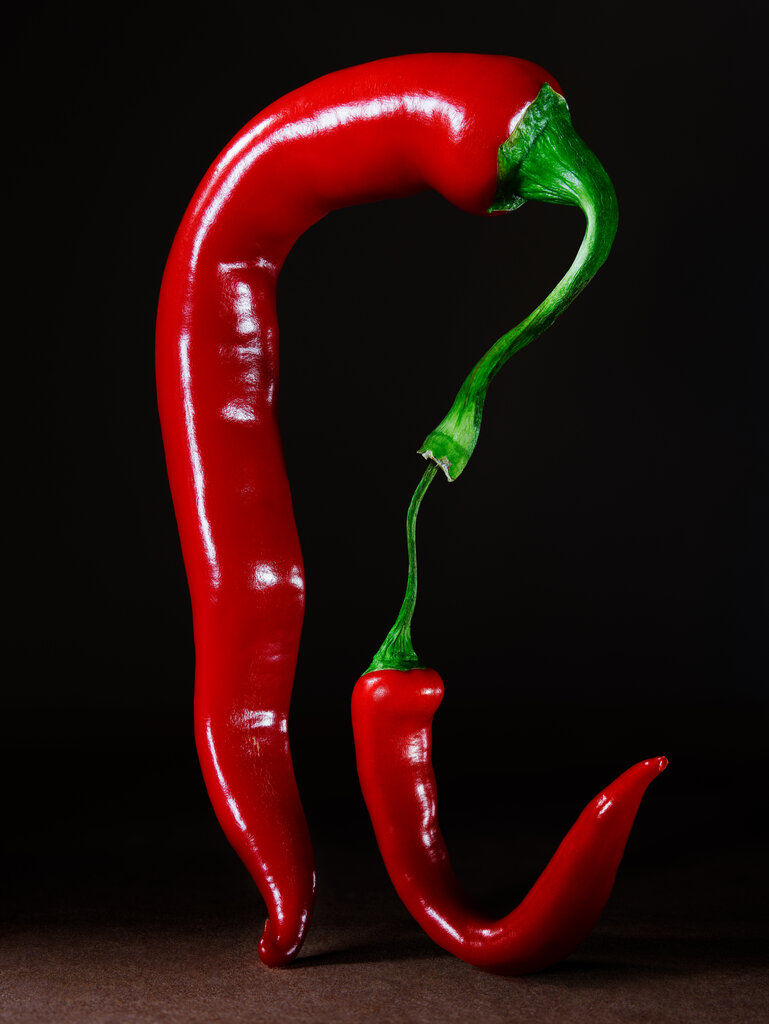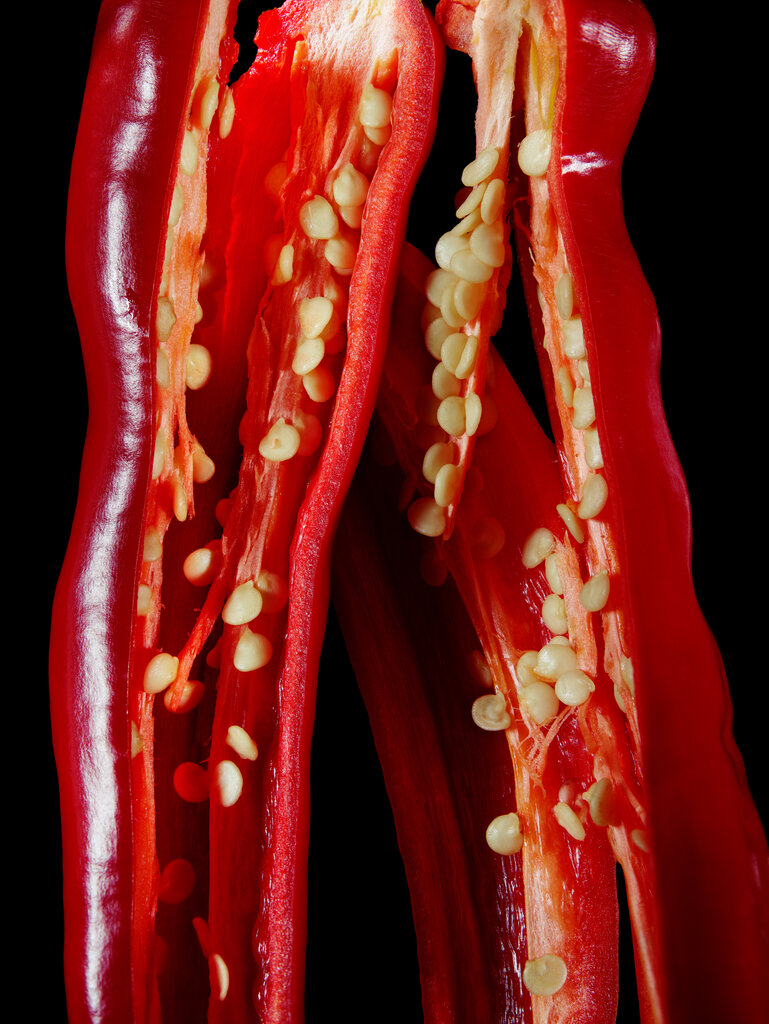


Q: I eat spicy food almost every day. I love the taste and the tingle, but I wonder: How is all that heat affecting my body?
问:我几乎每天都吃辛辣食物。我喜欢它的味道和刺激的感觉,但我好奇:这些辛辣对我的身体有什么影响?
Eating spicy food can produce a variety of physiological reactions, like a tingling in the tongue and lips, as well as sweating, said David Julius, a physiologist at the University of California, San Francisco.
加州大学旧金山分校的生理学家戴维·朱利叶斯说,吃辛辣食物会产生多种生理反应,例如舌头和嘴唇发麻以及出汗。
“We all enjoy sensory experiences; spicy foods make life more interesting,” he said.
“我们都享受感官体验;辛辣的食物让生活更有趣,”他说。
But not all of the potential responses are welcome, even for those who enjoy the taste.
但并不是所有可能出现的反应都是人们想要的,即使对那些喜欢吃辣的人来说也是如此。
Here’s what we know about how spicy food affects the body — in both good and bad ways.
以下是我们了解到的辛辣食物对身体的影响——有好的也有坏的。
It makes you sweat
吃辣让你流汗

Spicy food lovers are likely to be familiar with one immediate physical reaction — sweating.
喜欢吃辣的人可能很熟悉这种即刻的身体反应——出汗。
That’s because some of the spiciest foods contain compounds that bind to nerve receptors along the gastrointestinal tract, including the mouth, that are activated by heat.
这是因为一些最辣的食物含有一些化合物,能与包括口腔在内的消化道的神经受体结合,这些受体可以被灼热激活。
Chiles, the flavorful backbone of many spicy dishes, contain the compound capsaicin, which binds to those receptors when eaten and then sends a pain signal to the brain, as Dr. Julius discovered in his Nobel Prize-winning work on the topic.
辣椒是许多辛辣菜肴的基础调味品,含有复合辣椒素,朱利叶斯在他的诺贝尔奖获奖研究中发现,辣椒素在被食用时会与这些受体结合,然后向大脑发送疼痛信号。
The main chemicals found in peppercorns, horseradish and mustard also bind to the same receptors, albeit less potently.
花椒、辣根和芥末中发现的主要化学物质也与这些受体结合,尽管效力较低。
These nerves send similar signals to the brain as they would if you came into contact with actual fire, which is why you might start sweating or become flushed; that’s the body’s way of cooling itself down.
这些神经会向大脑发送类似的信号,就好像碰到了火,这就是为什么你可能会开始出汗或脸红的原因;这是身体在给自己降温。
“Capsaicin fools your body into thinking the temperature has risen, and so your brain thinks it needs to shed heat,” Dr. Julius said. “In humans, we mostly do that by sweating.”
“辣椒素让你的身体误以为温度升高了,所以你的大脑认为它需要散热,”朱利叶斯说。“对于我们人类来说,主要通过出汗来达到散热。”
It can cause gastrointestinal distress
它会引起肠胃不适
Eating spicy food in moderation is generally safe for people who don’t already have stomach issues. However, it can cause inflammation to the areas that aid digestion and can sometimes lead to heartburn, stomachaches or diarrhea.
对于没有胃病的人来说,适度吃辛辣食物通常是安全的。但是,它会导致帮助消化的区域发炎,有时会导致胃灼热、胃痛或腹泻。
People with gastritis, which occurs when the lining of the stomach is inflamed, may be especially susceptible to increased abdominal pain.
有胃炎的人——当胃壁发炎时——可能特别容易出现腹痛。
It may benefit health, though more research is needed
它可能有益于健康,但还需要更多研究
Studies have shown that consuming spicy foods can be associated with some health benefits. For example, one study found that taking a daily supplement of capsaicin (containing the same amount in four or five habanero peppers) sped up metabolism, where participants burned the equivalent of an extra 200 calories per day over a 14-week period.
研究表明,食用辛辣食物可能对健康有益。例如,一项研究发现,每天补充辣椒素(摄入量相当于四到五个哈瓦那辣椒)可加快新陈代谢,受试者在14周的时间内每天多燃烧相当于200卡路里的热量。
And in a 2022 study involving more than 6,000 adults, scientists found that chile intake was linked with a reduction in calcium buildup in the walls of the coronary arteries, which supply blood to the heart.
在2022年的一项有6000多名成年人参与的研究中,科学家们发现,辣椒的摄入量与冠状动脉壁中钙积聚的减少相关联,冠状动脉为心脏供血。
It’s unclear, however, whether eating spicy foods regularly can reduce the likelihood of obesity or heart attacks in the long term.
然而,从长远来看,尚不清楚经常吃辛辣食物是否能降低肥胖或心脏病发作的可能性。
The evidence is mixed on whether spicy foods raise or lower your cancer risk. A few studies have found that daily consumption of chiles is associated with an increased risk of esophageal cancer, but not of gastric or colorectal cancers.
关于辛辣食物会增加还是降低患癌风险的证据存在差异。一些研究发现,每天食用辣椒会增加患食道癌的风险,但不会增加胃癌或结直肠癌的风险。
And while several experiments performed on cells in labs have found that capsaicin and piperine — the chemical found in peppercorns — may help impede or destroy human breast cancer cells, scientists don’t yet know if these findings might one day lead to potential treatment.
虽然在实验室中对细胞进行的几项实验发现辣椒素和胡椒碱——花椒中发现的化学物质——可能有助于阻止或破坏人类乳腺癌细胞,但科学家们尚不知道这些发现在将来是否会有助于潜在的治疗。
One study published in 2015, of nearly half a million people in China, did find that those who ate spicy food six to seven times per week for several years had a 14 percent reduced risk of death compared with those who ate spicy food less than once per week.
2015年发表的一项针对中国近50万人的研究确实发现,那些连续几年每周吃六到七次辛辣食物的人,与那些每周少于一次的人相比,死亡风险降低了14%。
The researchers thought these results were possibly related to the spicy foods’ antioxidant and anti-inflammatory effects, which can protect against many health conditions such as diabetes and certain types of cardiovascular disease.
研究人员认为这些结果可能与辛辣食物的抗氧化和抗炎作用有关,这可以预防许多疾病,如糖尿病和某些类型的心血管疾病。
Rarely, extreme reactions may occur
极少数情况下,可能会发生极端反应
In rare cases, very hot peppers have caused extreme physiological reactions, like thunderclap headaches or vomiting so severe it ruptured someone’s esophagus — though such situations aren’t typical for the average person or pepper.
在极少数情况下,非常辣的辣椒会引起极端的生理反应,例如霹雳性头痛或导致食道破裂的严重呕吐——尽管这种情况对于普通人或在食用普通辣椒时并不常见。
If you’ve just taken a bite of food that has more spice than you can handle, it’s best to reach for something with high fat content, like a glass of milk or a spoonful of sour cream, Dr. Julius said.
朱利叶斯说,如果你刚吃下一口辣味超过你的承受能力的食物,最好吃一些脂肪含量高的食物,比如一杯牛奶或一匙酸奶油。
Capsaicin is a fat-soluble compound, meaning it won’t dissolve in water no matter how much you chug.
辣椒素是一种脂溶性化合物,这意味着无论你喝多少水,它都不会溶解。
“Eating something with fat helps draw the capsaicin out of your tissues when you’re in pain,” he said. “Water usually doesn’t do a whole lot at that point.”
“当你感到疼痛时,吃含脂肪的东西有助于将辣椒素从你的器官中吸出,”他说。“这个时候水通常起不了多大作用。”
It’s important to respect your own limits and not overestimate how much heat your body can take, Dr. Julius added. With the right balance, you may find that a mild scorch is what makes the meal satisfying.
朱利叶斯补充说,重要的是要尊重你自己的极限,不要高估你的身体对辣的承受能力。通过适当的平衡,你可能会发现,适度的辣味让你的这顿饭吃得十分满足。
And whether you are eating for health or for taste, experts say, if you love spicy foods and your body can handle it, there’s no reason to avoid them.
专家说,无论你是为了健康还是为了美味,如果你喜欢辛辣食物并且你的身体可以承受,没有必要回避。
翻译:明斋